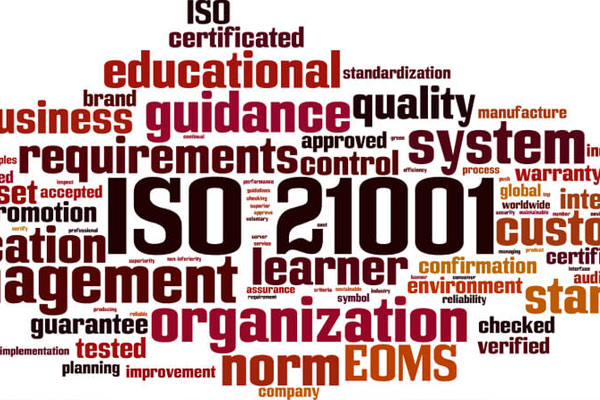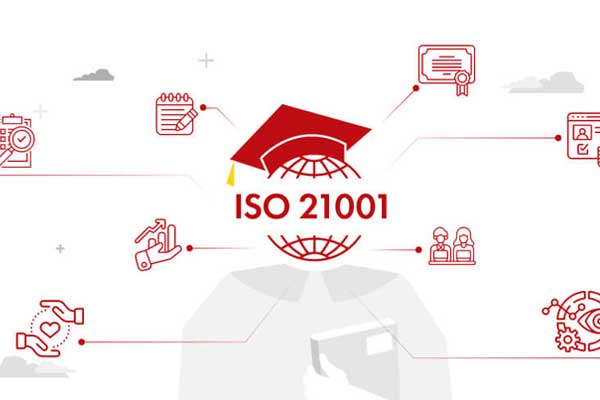ISO 9001 presents a set of management tools that any organisation can use to build a fruitful Quality Management System (QMS). ISO 21001:2018 is a deeper and broader standard compared to ISO 9001:2015, with the addition of many lower-level clauses. Let us explore the difference between the two by reading the following article.
What is ISO 9001?
Simply put, ISO 9001 amalgamates the seven principles of quality management to help organisations build a customised management system, known as a QMS, that can appropriately identify customer needs. The seven quality management principles include customer focus, evidence-based decision-making, relationship management, continual improvement, leadership commitment, process-based approach, and employee engagement. As a result, the quality management system helps organisations build services or products that impeccably fit their customers’ needs. Hence, the benefits of ISO 9001 include more significant profits, customer acquisition and retention, better brand credibility, and consistency in the quality of products or services.
What is ISO 21001?
ISO 21001 is based on quality management principles and has a quality management system founded on the recommendations of ISO 9001; however, it provides a specific framework for educational organisations. The standard aims to enhance the learners’ satisfaction by improving the quality of their educational processes. The secondary aim is to ensure that the educational organisation always conforms to learner requirements. Similar to ISO 9001, there are many principles that form its foundational basis. These include:
- Evidence-based decisions.
- Improvement.
- Process approach.
- Engagement of people.
- Visionary leadership.
- Focus on learners and other beneficiaries.
- Relationship management.
- Social responsibility.
- Data security and protection.
- Ethical conduct in education.
- Accessibility and equity.
Benefits of ISO 21001
There are many potential benefits of implementing this standard in your educational organisation, including:
- Better alignment of educational mission, objectives, vision and action plans with the students
- Inclusive and equitable education quality for all
- Enhanced personalisation in learning, leading to an effective response
- Promotion and enhancement of self-learning and alignment with lifelong learning opportunities.
- Increased credibility for the educational organisation.
- Consistent evaluation, tools and processes demonstrate the educational organisation’s relevance.
- Continuous model for improvement, helping the organisation identify better growth opportunities.
Harmonisation of international or national standards within an international template/framework.
Similarities between ISO 9001 and ISO 21001
Both standards are based on quality management and focus on the impact of the products or services on the users. Both documents follow a high-level structure, identical core and common terms with co-definitions. Both standards are designed to benefit the users, implementing multiple ISO management system standards, therefore, adhere to the same implementation steps. This means that if an organisation already has ISO 9001 or ISO 21001, it will find it easier to implement ISO 14001 or ISO 45001. Another similarity between both standards is that they can be implemented alongside other standards, which may be regional, national, open, or proprietary.
Differences between ISO 9001 and ISO 21001
Almost all the clauses of ISO 9001:2015 and ISO 21001:2018 are identical, similar and interacting. The critical difference between the two standards is that ISO 9001 focuses on customer satisfaction, whereas ISO 21001 focuses on the satisfaction of learners and other beneficiaries. Examples of other beneficiaries include government bodies, labour markets, and parents or guardians.
How can you improve the efficiency of the ISO standard?
As you implement the ISO standard in your organisation, you will realise that there are many gaps between theory-practice. These differences will push you away from your compliance requirements as they may or may not be functioning in the manner that ISO recommends. For this purpose, it is always beneficial to conduct self-evaluations before approaching a certification body for your certificate. This is where internal audits come into play.

How to conduct an internal audit ISO 9001
To conduct an ISO 9001 internal audit of your QMS, you must begin by planning the audit schedule and going on to plan the process audit. Take time to plan your audit schedule. You will allow your process owners to finish any improvement projects that they are currently working on so that they can help you gather valuable information that will aid your implementation. Therefore, the auditing team in your organisation should be very diligent while creating the process audit plan and the audit schedule to ensure that every part of the QMS is given appropriate attention. After planning the audit process and schedule, all that is left is to conduct the actual audit. Sticking to a checklist is extremely beneficial, as it ensures that you have not left any crucial steps. If the audit is done correctly, you will uncover issues that need your attention. Customised improvement plans and corrective actions should be applied, and follow-up on these issues should be taken to ensure they are not re-occurring. This is where ISO certification consultants come in handy.
ISO certification consultants
Yes, auditing can help you identify hidden flaws in your management system, but suggesting and implementing relevant corrective actions is another ball game. ISO certification consultants help you troubleshoot your management system and guide you in every step of the compliance journey. With their help, achieving compliance and acquiring the certification becomes a walk in the park.
Cost for ISO 9001 certification
The cost of certification is variable, as it depends on many factors such as the size, complexity, scope and number of outlets of the organisation. However, as a general rule of thumb, an organisation is charged $15,000 if they have a single outlet and less than 1000 employees.
Conclusion
ISO 21001 is based on ISO 9001 and has additional relevant specifications for educational organisations.









Users Comments
Get a
Quote